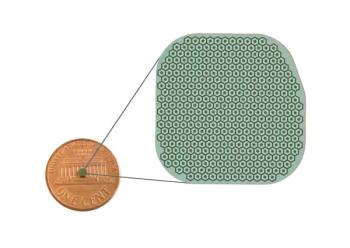
Gladwell: Health care is a mystery wrapped in a puzzle
Anaheim, CA-The current state of health care in the U.S. is a blend of pathologies and policies-a mystery wrapped in a puzzle, says
Based on the way our healthcare system is currently running, we’re nowhere close to addressing this mystery in a way that can meet the needs of both patients and providers, he says.
Several key trends have contributed to this system of poor decision-making and misplaced priorities, says Gladwell:
• Individual judgment ignored as a necessary skill
• Lack of time given to both patients and practitioners in healthcare settings
• Competing yet conflicting goals of greater patient volume and individualized care
Related:
The mysteries of healthcare
Delivering the plenary session address at the American Academy of Optometry annual meeting in Anaheim, Gladwell says the prevalence of a “puzzle-solving” mindset in our society at every level, from education frameworks to business models to healthcare policies.
According to Gladwell, we have established ourselves as a problem-solving culture wherein we seek to gain more and more data to try to solve the puzzles of our day. However, this perspective is shortsighted in an age when we’re overloaded with information.
He compares the medical practices of today against our strategies from 50 years ago.
For example, detecting prostate cancer in the mid-20th century followed a simple formula. Patients visited the doctor for an exam. If the doctor found something concerning, the doctor acted on it.
With the advancements to medical science information that we have today, as Gladwell says, the doctor’s role changes to something more like an analyst.
“They have to take a piece of information that has highly variable set of meanings, and they have to interpret it,” he says.
Aside from the increased number of decisions that must be made, providers are stymied by the complexities of patient preference.
Related:
“You have gone from having an operational role-from being simply someone who did an action-to a social role,” says Gladwell.
No longer are providers information collectors; they’re now analysts.
It’s this changing definition of what it means to be an effective decision-maker in the healthcare profession that moves the healthcare problem from a solvable “puzzle” to a something akin to an enigmatic mystery.
Related:
“The great challenge of the 21st century is to reorient ourselves to deal with mysteries,” says Gladwell.
In Gladwell’s opinion, one key variable healthcare providers must have if they are to adapt to this change: good judgement.
The value of judgement
Judgement has always been an essential skill for any healthcare provider, but as Gladwell points out, its role is becoming increasingly important as the challenges that providers face become more complex.
As an example of the importance of judgement, he points to the U.S. education system and its method for determining the quality of a teacher.
Related:
This process is challenging and time-consuming. According to Gladwell, this is the exact reason why so many industries use rudimentary tests to determine qualifications and why legislation toward goals often doesn’t create the results we expect.
“We’re always trying to duck from making the hard and important decisions that are necessary if a profession is going to improve the quality of its work,” he says. “We’re not facing up to the fact that picking good teachers isn’t a puzzle-it’s a mystery.”
The same is true in the healthcare world. Gladwell warns practitioners that the individual judgement of each provider is becoming essential for achieving better patient outcomes.
Unfortunately, the healthcare industry doesn’t give practitioners the time they need to make these necessary assessments.
Related:
Running out of time
Aside from judgement, time is one of the most important commodities for healthcare practitioners, Gladwell says.
But with a healthcare system that prioritizes patient volume over interaction quality, patient outcomes will naturally suffer. The problems this creates are twofold-patients lose confidence in their providers, and providers lose confidence in the system in which they work.
“When you place these kinds of constraints on deliberation in a healthcare setting, you exacerbate those problems of confidence,” Gladwell says.
He says that the amount of time allotted for each patient has stayed the same over the past 30 years. In that time, medical concerns facing patients have increased in scale and complexity and should logically receive more time than was allotted for the standard protocols from decades past.
When considering competing national healthcare goals, the problems increase further:
• On a macro level, the healthcare system is pushing for higher patient volume, faster appointments, and more standardized care practices
• On the doctor/patient level, both patients and providers seek more individualized care and stronger interpersonal communication
Related:
Gladwell says these challenges are exacerbated by shifts in the world of patient care, specifically, with new technologies such electronic health records (EHR) that practitioners are told are the answers to their woes.
“In today’s world, where the important thing is to establish a rapport with your patient, have a conversation with him, understand him as an individual, establish a relationship of trust with the person on the other side of the table. In that situation, how can you do any of those things when you’re sitting and staring at your computer screen-checking off boxes,” says Gladwell.
Judgment plays an important role in managing these expectations, he says. There’s a need for a fundamental shift in the healthcare system, spurred by practitioners, that prioritizes the individual experiences of both the patient and provider.
Related:
The future of healthcare
“We’ve got a world that is insisting, increasingly, that healthcare is a puzzle,” Gladwell says. “And then we have healthcare itself, which we are more and more realizing is a mystery.”
Healthcare should be more than merely checking a box-the need for increased judgment on behalf of providers makes decision-making more complex.
“What I want is the time and the attention and the care and the judgment of the person with whom I am sharing some of the most intimate details of my life,” he says. “What I don’t want is someone just checking a box or looking at his watch.”
Gladwell calls optometric professionals-and the healthcare system as a whole-to action: speak up and help patients. Realize that health care shouldn’t be a puzzle but rather a mystery that should be approached with open eyes and an open mind.
Related:
Newsletter
Want more insights like this? Subscribe to Optometry Times and get clinical pearls and practice tips delivered straight to your inbox.




























